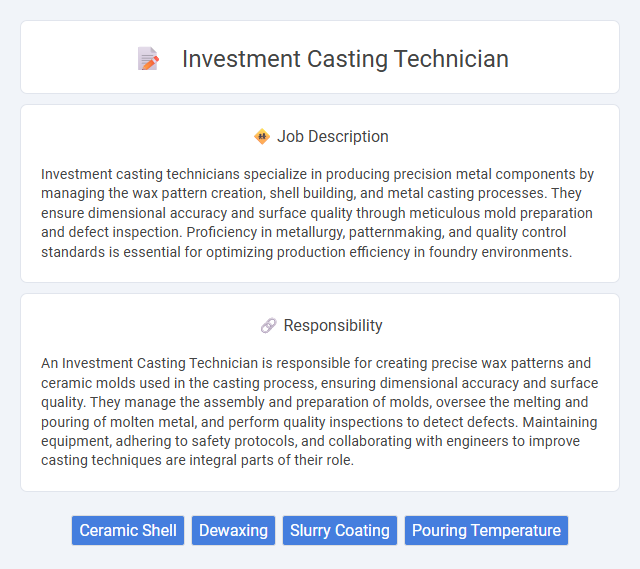
Investment casting technicians specialize in producing precision metal components by managing the wax pattern creation, shell building, and metal casting processes. They ensure dimensional accuracy and surface quality through meticulous mold preparation and defect inspection. Proficiency in metallurgy, patternmaking, and quality control standards is essential for optimizing production efficiency in foundry environments.
Individuals with strong attention to detail and steady hands are likely suitable for the role of an investment casting technician due to the precision required in handling molds and molten materials. Those who are comfortable working in environments with exposure to heat and casting fumes might adapt better to the physical conditions of the job. Conversely, people who struggle with repetitive tasks or have sensitivities to heat may find this position less suitable.
Qualification
An Investment Casting Technician typically requires a high school diploma or equivalent, with additional technical training or certification in metallurgy, materials science, or foundry technology strongly preferred. Proficiency in interpreting blueprints, performing mold assembly, and understanding the casting process is essential, along with hands-on experience in metalworking or quality inspection. Advanced knowledge of furnace operation, defect analysis, and pattern production enhances job performance and career advancement opportunities in precision manufacturing industries.
Responsibility
An Investment Casting Technician is responsible for creating precise wax patterns and ceramic molds used in the casting process, ensuring dimensional accuracy and surface quality. They manage the assembly and preparation of molds, oversee the melting and pouring of molten metal, and perform quality inspections to detect defects. Maintaining equipment, adhering to safety protocols, and collaborating with engineers to improve casting techniques are integral parts of their role.
Benefit
Investment casting technician positions likely offer competitive salaries and opportunities for skill development in advanced manufacturing processes. Job stability and potential career growth within industries such as aerospace, automotive, and medical devices may be probable benefits. Access to hands-on experience with precision metal casting techniques could enhance long-term employability in specialized production roles.
Challenge
The role of an investment casting technician likely involves navigating complex challenges related to precision and quality control in metal casting processes. Difficulties may arise from the need to manage intricate mold designs, control material properties, and maintain strict tolerances to prevent defects. Problem-solving skills and attention to detail could be crucial in overcoming these technical obstacles to ensure successful casting outcomes.
Career Advancement
Investment casting technicians develop specialized skills in mold preparation, wax pattern assembly, and metal pouring that serve as a foundation for career advancement in manufacturing and metallurgy industries. Mastery in quality control, defect analysis, and process optimization opens pathways to supervisory roles, production management, and engineering positions. Continuous training and certification in foundry technology and materials science significantly enhance prospects for promotion and higher salary brackets.
Key Terms
Ceramic Shell
Investment casting technicians specialize in creating precise ceramic shell molds crucial for high-quality metal casting. Mastery in ceramic slurry application, stuccoing, and drying processes ensures defect-free investment shells that withstand high temperatures and maintain dimensional accuracy. Expertise in shell repair and quality control directly impacts the integrity and surface finish of the final cast components.
Dewaxing
Investment casting technicians specializing in dewaxing expertly remove wax patterns from ceramic shells to ensure flawless mold integrity. Precise control of temperature and timing during the dewaxing process is critical to prevent shell cracking and maintain the dimensional accuracy of cast components. Mastery of steam autoclave operation and thermal analysis optimizes wax elimination, enhancing the quality of high-precision metal castings in aerospace and automotive industries.
Slurry Coating
Investment casting technicians specializing in slurry coating apply precise ceramic molds by immersing wax patterns in a liquid ceramic slurry to achieve uniform thickness and optimal surface finish. Mastery of slurry viscosity, coating time, and drying processes ensures defect-free molds that withstand high temperatures during metal pouring. Expertise in slurry coating enhances casting accuracy, reduces surface imperfections, and improves overall production efficiency in the investment casting process.
Pouring Temperature
Investment casting technicians carefully monitor pouring temperature to ensure metal flows smoothly into molds, typically maintaining temperatures between 1400degF and 3000degF depending on the alloy used. Precise control of pouring temperature directly affects the quality of the final cast, minimizing defects such as porosity and incomplete mold filling. Advanced thermocouples and temperature control systems are utilized to maintain consistent heat levels during the casting process.
 kuljobs.com
kuljobs.com